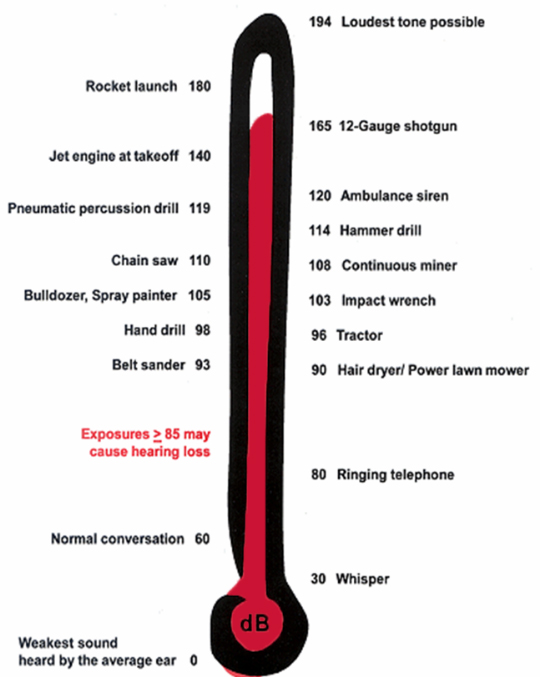What is NIHL and what causes it?
Noise-Induced Hearing Loss (NIHL) is permanent hearing loss caused by prolonged exposure to high levels of noise and damage to the inner ear. NIHL can be immediate because of exposure to an intense sound such as an explosion or it can take a long time to be noticeable. It can affect one or both ears.
Sound is measured in units called decibels. Sounds of less than 75 decibels, even after long exposure, are less likely to cause hearing loss. However, long or repeated exposure to sounds at or above 85 decibels can cause hearing loss. The louder the sound, the faster NIHL occurs.

The intensity of the sound, frequency, duration and years of exposure are important in determining the effects of the sound on your ears. A good rule of thumb is to avoid noises that are too loud, too close, or last too long – particularly for sounds at 85 decibels and above.
What you need to prove NIHL for an employee:
• Baseline audiogram (Initial screening audiogram) – indicating the level of hearing when the employee first started working in a noise zone by means of the initial screening audiogram which could have been performed at a previous employer or when they started working
• A diagnostic audiogram showing the degree and type of hearing loss;
• Evidence indicating that the employee is exposed to excessive noise, over 85 decibels and for more than 8 hours a day or 40 hours a week;
• Evidence showing that the type of hearing loss is due to noise exposure and not the various other causes of hearing loss as confirmed in a medical report.
What you need to submit for a NIHL claim:
- Two diagnostic audiograms conducted on the same day with a reasonable break between the two audiograms. These should only be conducted after 24 hours of the employee having been removed from the noisy environment;
- The baseline audiogram;
- A certified copy of an ID document or passport;
- Attestation document -Certified proof of identity completed by the Audiologist or ENT specialist;
- A full record of service, documenting the noise level exposure for each of the employee’s occupations or positions during his/her working career – if the employee has not been exposed to noise, this should also be recorded as such;
- Medical report compiled by the Occupational Health Practitioner – this is the doctor responsible for the occupational health examinations of the company’s employees; and
- If the percentage hearing loss is greater than 30%, the employee is to be seen by an ENT (ear/nose/ throat) specialist. The ENT specialist is to include in the first medical report the full medical history of the employee, such as treatment with ototoxic drugs, ear surgery and otitis media.
If your operation is a noisy environment, all appropriate measures to protect employees’ hearing should be taken. This includes employees wearing hearing protective devices (HPDs) when exposed to noise and taking the necessary precautions to reduce the sound at source (such as putting machines in a muffling housing, for example). Other methods of protecting employees include rotating employees to ensure that they spend less time exposed to the noise, and testing their hearing every six months to understand the level of damage to their ears.
Your employees working in a loud noise environment should always have an audiogram at the start of their employment, so that you understand how good his or her hearing is before exposure.